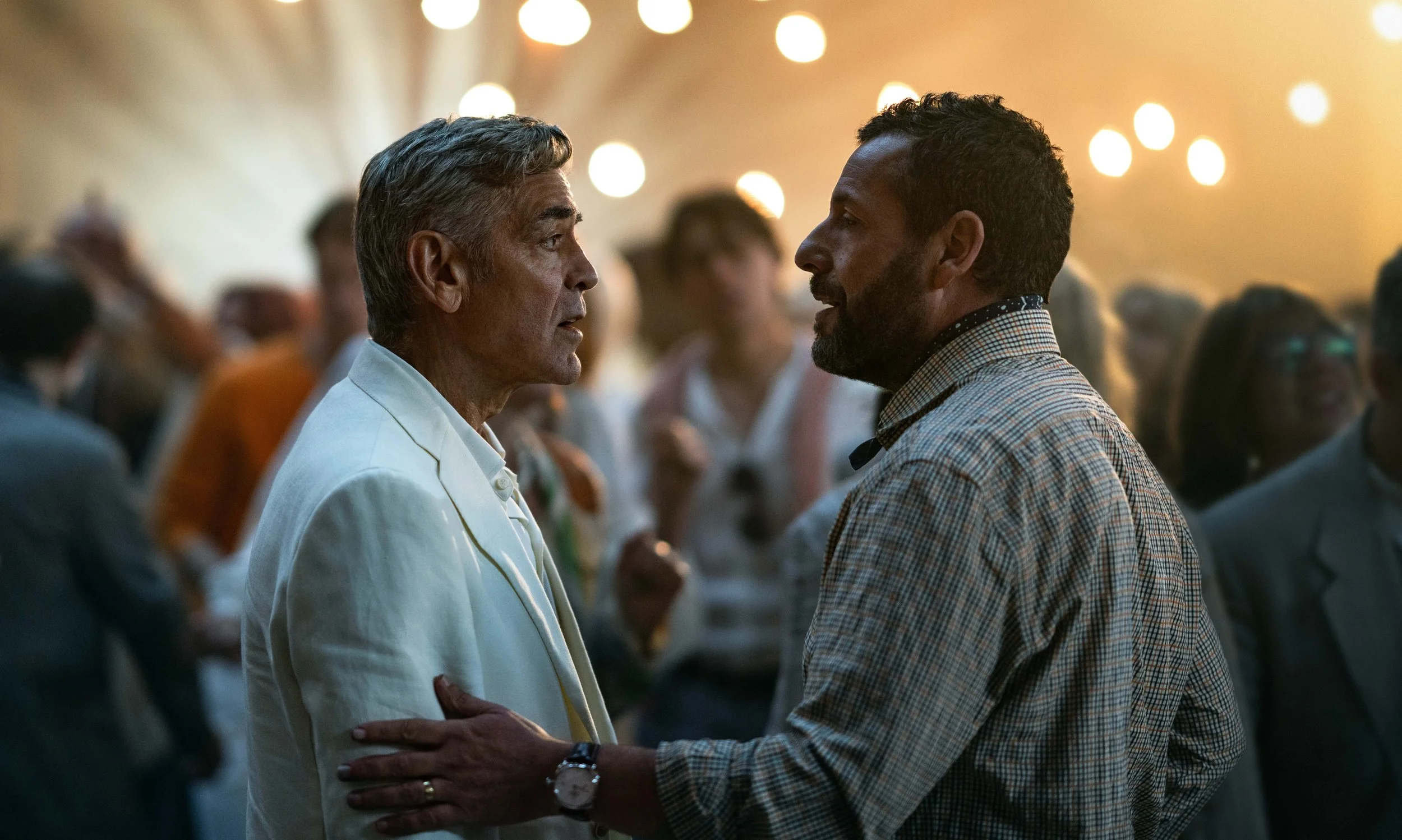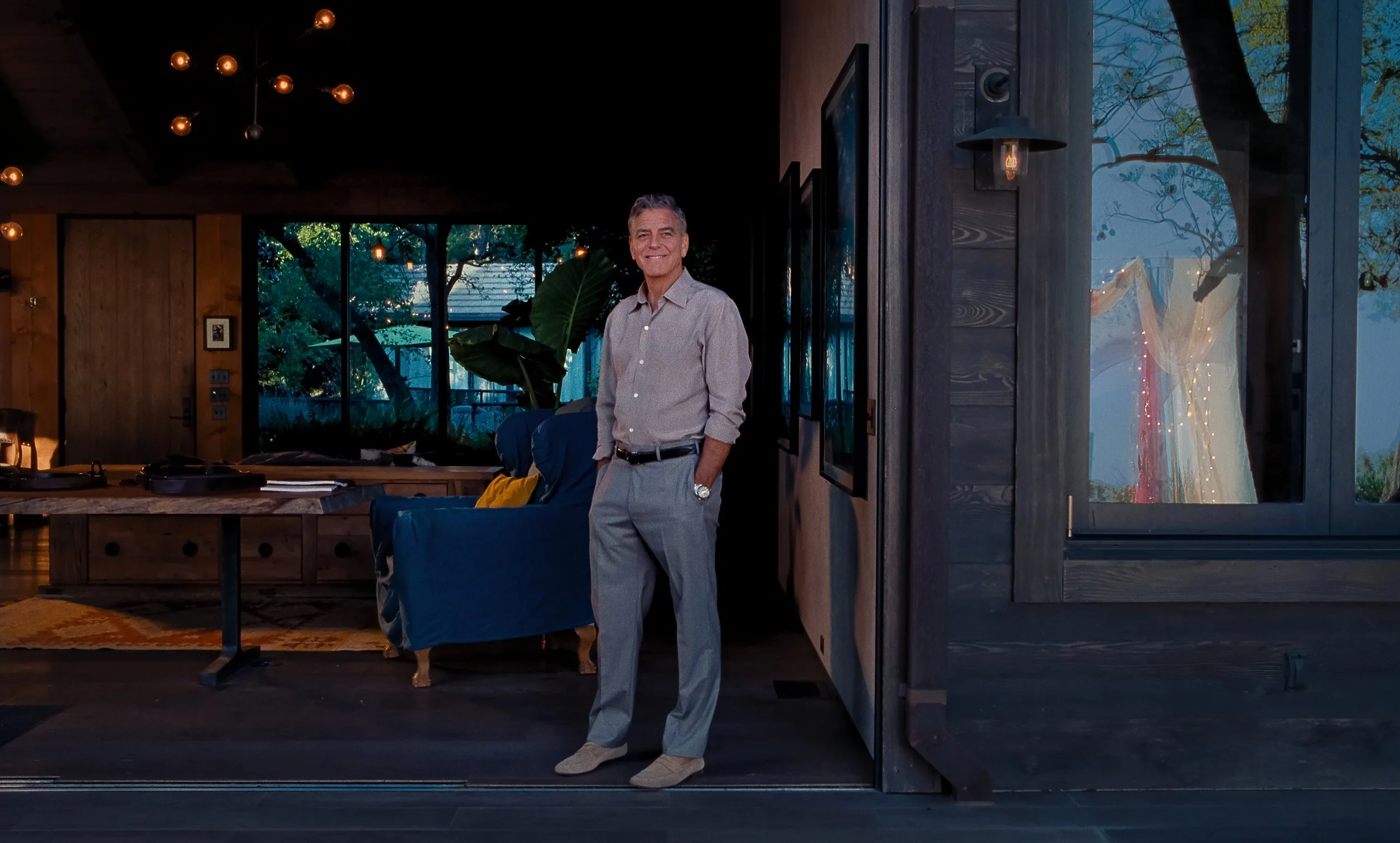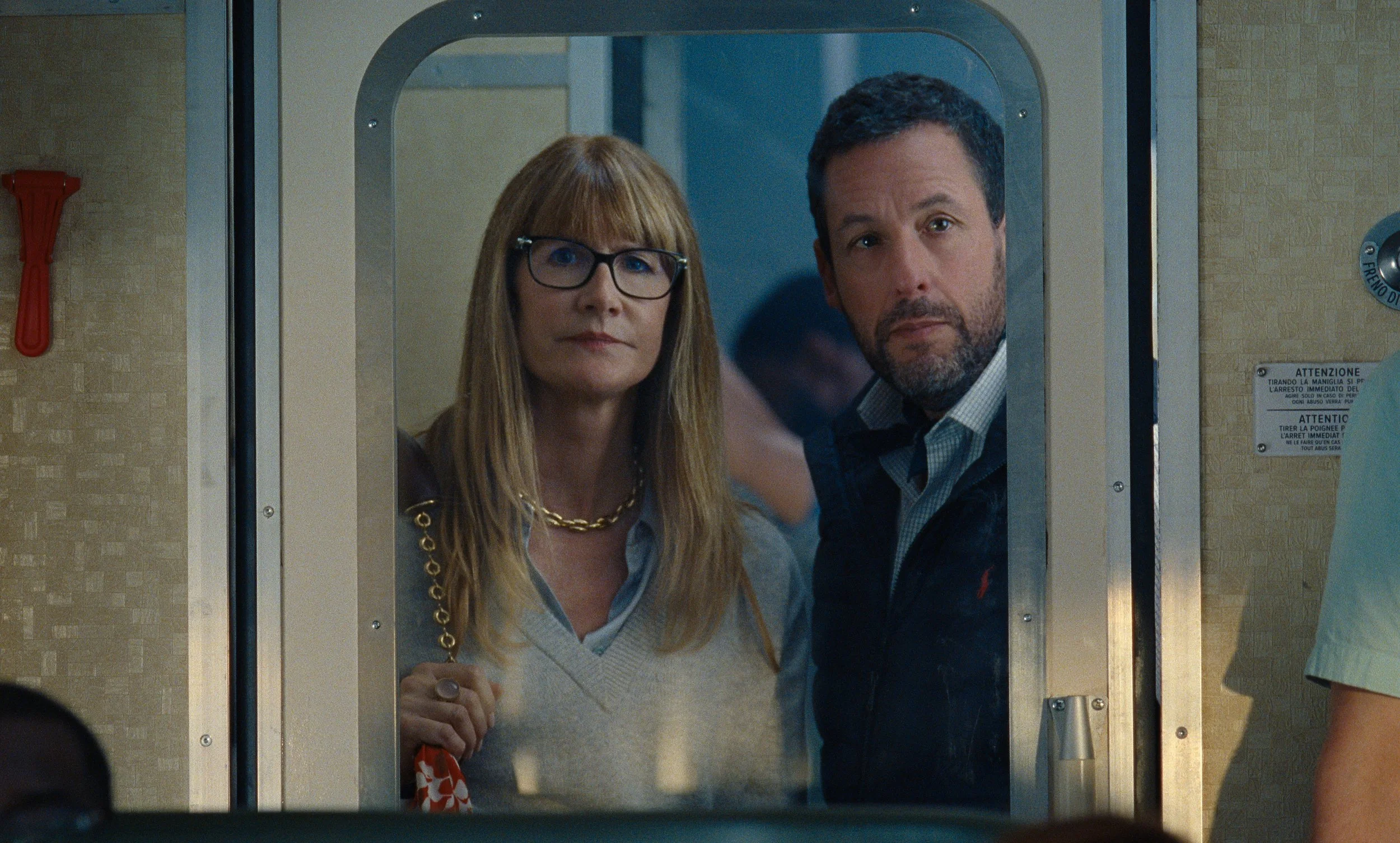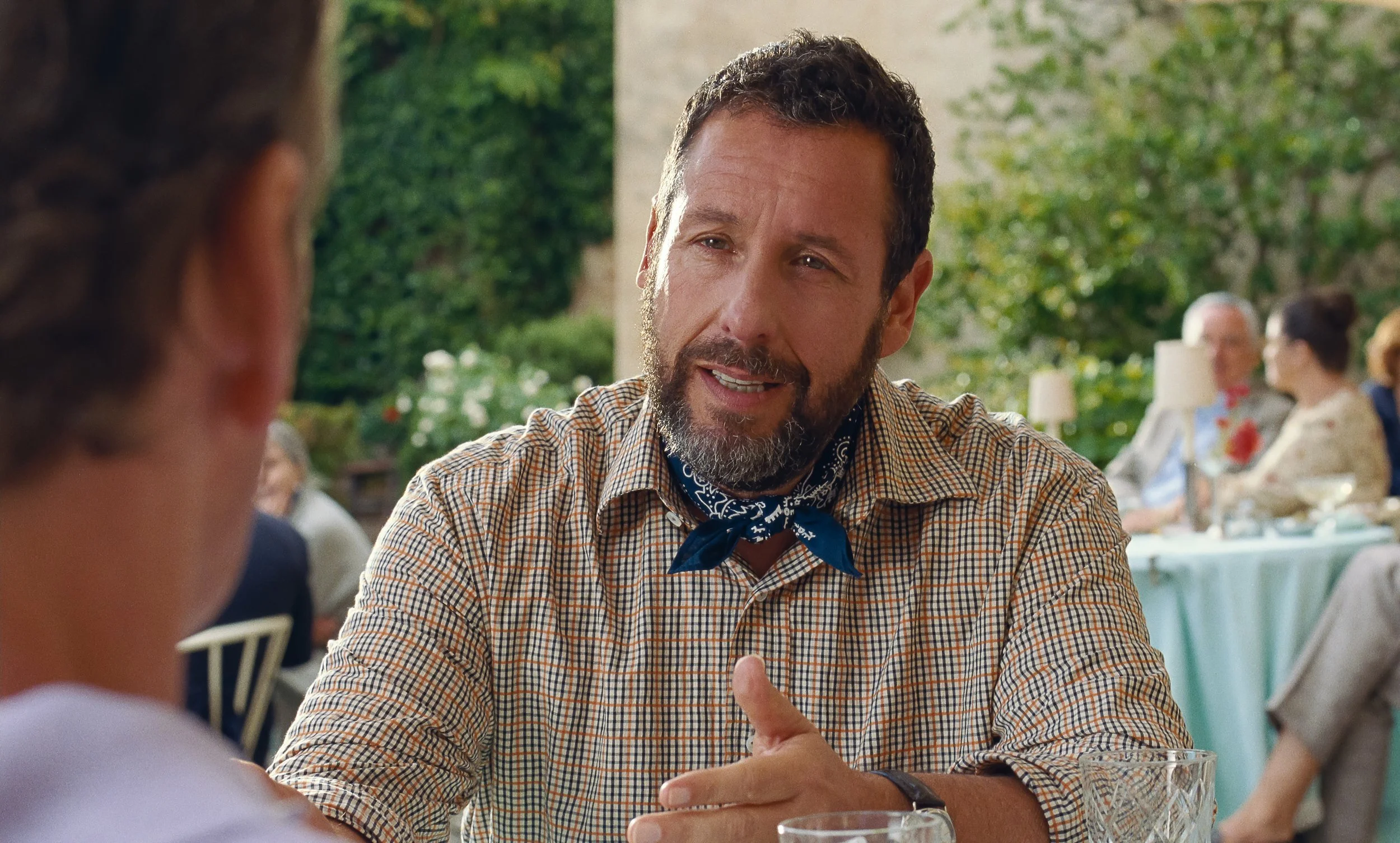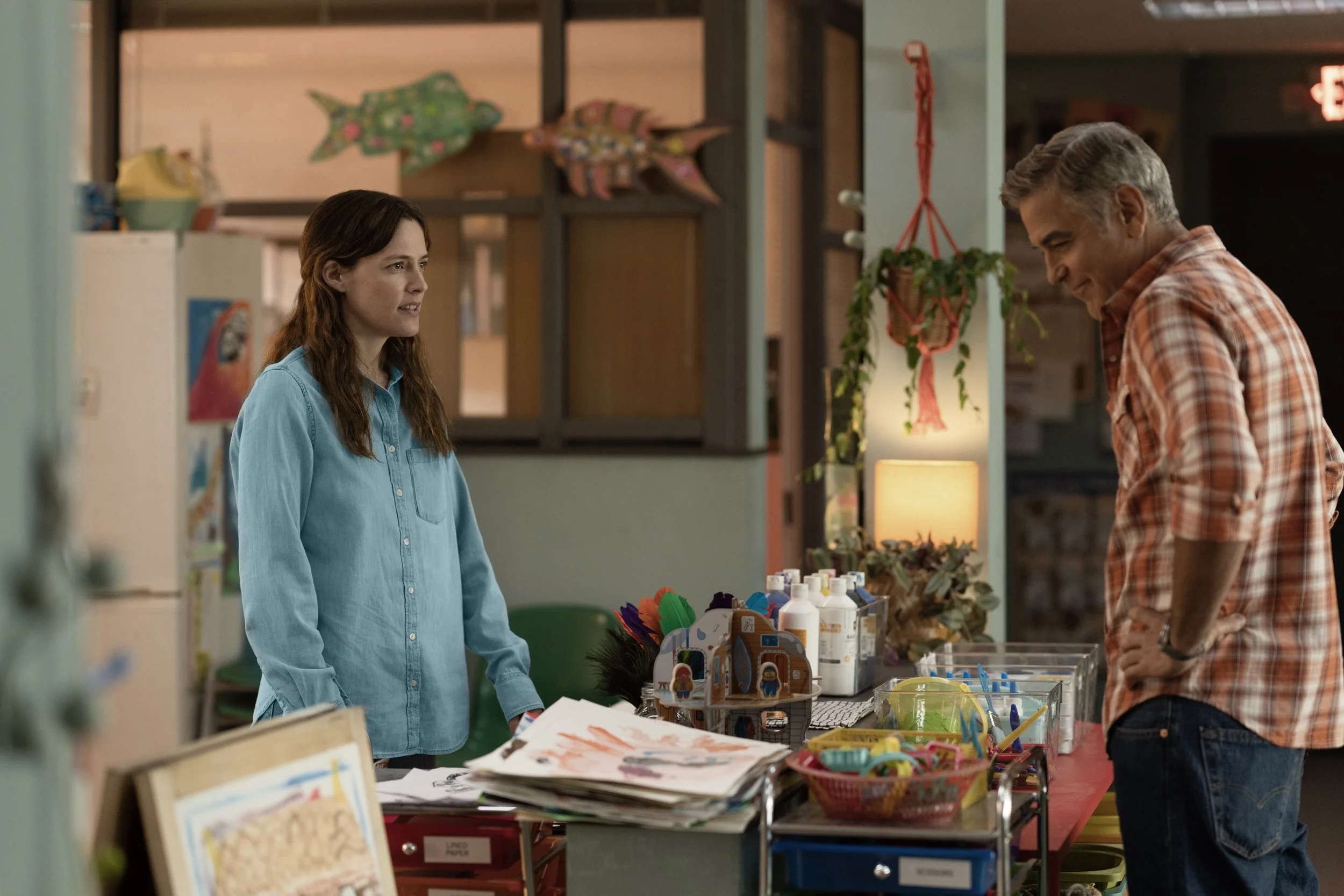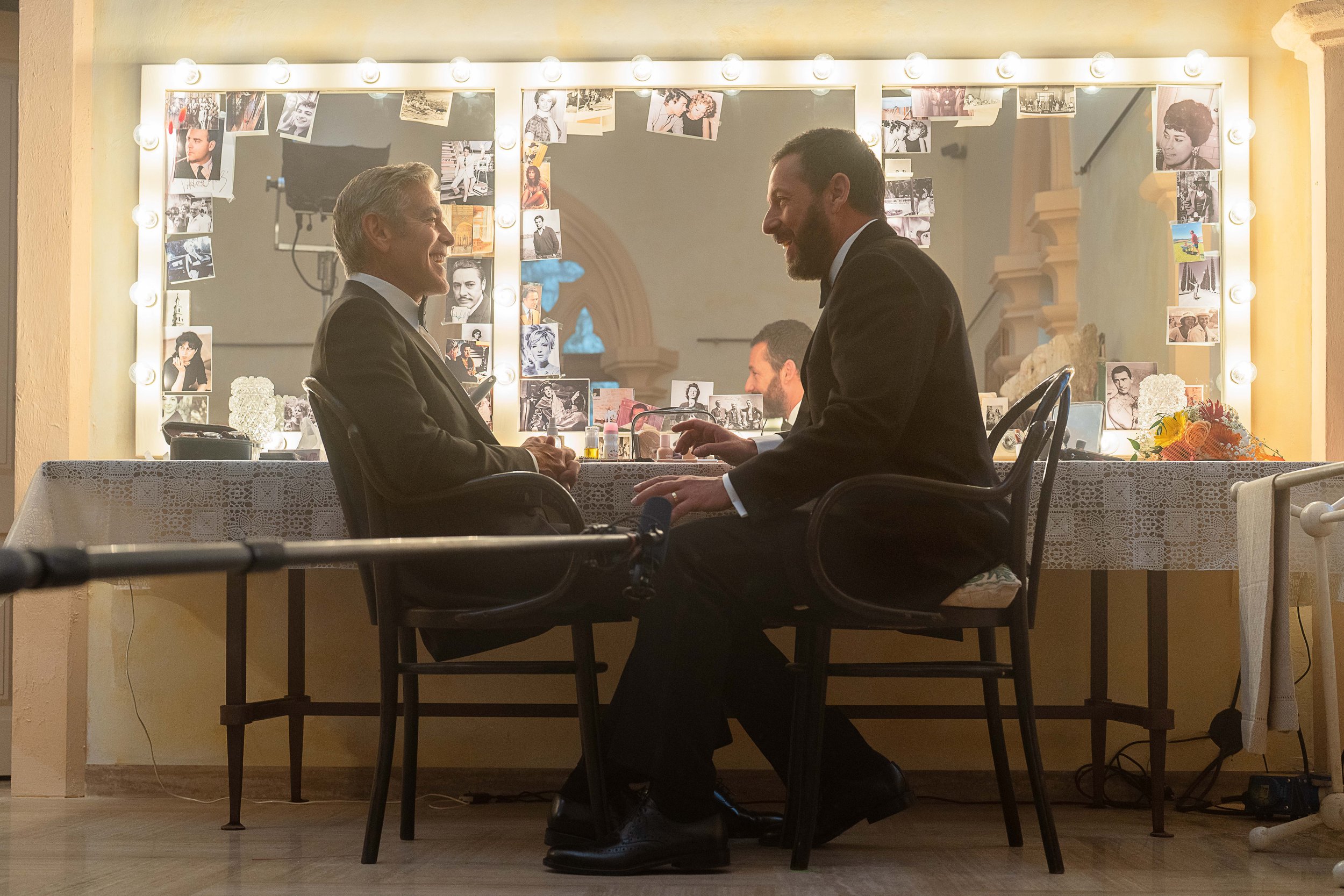Jay Kelly’ Review: Clooney Confronts Stardom While Sandler Delivers the Heart in Baumbach’s Bittersweet Drama
Jay Kelly. (L-R) George Clooney as Jay Kelly and Adam Sandler as Ron Sukenick in Jay Kelly. Cr. Peter Mountain/Netflix © 2025.
A meta and deeply felt comedy-drama about perspective, memory, and sacrifice — with Clooney’s charisma and Sandler’s vulnerability powering Baumbach’s latest.
Noah Baumbach’s best films have always been about performance — not in the theatrical sense, but in the way people perform their lives. Marriage Story explored the act of being a partner, Frances Ha the performance of artistry, The Squid and the Whale the roles we inherit from parents. With Jay Kelly, co-written with Emily Mortimer, Baumbach turns his gaze on the grandest performance of all: the movie star. What does it mean to be yourself when your entire existence has been playing yourself?
The film begins with a Sylvia Plath quote: “It’s a hell of a responsibility to be yourself. It’s easier to be somebody else or nobody at all.” The line echoes through the story like a warning bell. Baumbach and cinematographer Linus Sandgren then stage a bravura opening shot — a single unbroken take that winds through a bustling soundstage before landing on George Clooney’s Jay Kelly, flashing his trademark grin as he finishes a scene. It’s part homage to Altman’s The Player, part declaration of theme: Jay’s life is one continuous shot, one endless performance.
Jay Kelly. George Clooney as Jay Kelly in Jay Kelly. Cr. Netflix © 2025.
From the start, Clooney feels both perfectly cast and oddly vulnerable. His Jay Kelly is a silver-haired Hollywood god, capable of lighting up a piazza in Tuscany with a smile, but also a man hollowed out by decades of performing himself. Clooney leans into the meta conceit with melancholy charm, allowing his own charisma to work against him. This is Clooney as a man who has mastered every role except the hardest one: simply being George.
The plot unfolds chronologically but is constantly interrupted by memory, blurring performance and recollection. Jay plans to spend time with his youngest daughter Daisy (Grace Edwards) before she leaves for college, only to be rebuffed: she has her own life, her own plans, and no space for her father. He’s shaken, and even more so when his mentor Peter Schneider (Jim Broadbent, weary and warm) dies. At the funeral, Jay reconnects with Tim (Billy Crudup), his old roommate from acting class. Their reunion, nostalgic and tender at first, quickly dissolves into bitterness and fists. Crudup is essential here — a reminder that Jay’s life before fame was filled with real connection, something he can’t access anymore.
Jay Kelly. (L-R) Charlie Rowe as Young Jay and George Clooney as Jay Kelly in Jay Kelly. Cr. Peter Mountain/Netflix © 2025.
Baumbach literalizes Jay’s fractured interiority through elegant transitions. Jay walks through doors in the present and into memories of lovers, daughters, and his younger self. These dreamlike passages make memory itself feel cinematic — reels of someone else’s life projected on the walls of Jay’s mind. It ties to one of the film’s richest threads: are we protagonists in our own story, or merely background actors in someone else’s? Jay, once the center of everything, begins to realize he has become a supporting character in the lives that mattered most.
George Clooney is, in many ways, the perfect choice to play Jay Kelly. Like Jay, Clooney is a global icon, a silver-haired throwback to Hollywood glamour, a man whose smile can make piazzas in Tuscany look drab by comparison. The performance is meta — Clooney playing a movie star in a movie about a movie star who can’t stop playing himself. But rather than feeling indulgent, it’s strangely honest. Clooney leans into the performance with self-deprecating charm and melancholy grace. He allows the character’s hollowness to shine through his natural charisma, letting us see how Jay’s gift for playing roles has made him incapable of living his own life with any sincerity.
Jay Kelly. (L-R) Laura Dern as Liz and Adam Sandler as Ron Sukenick in Jay Kelly. Cr. Netflix © 2025.
If Clooney anchors the star persona, Adam Sandler provides the heart. As Ron Sukenick, Jay’s longtime manager and only real companion, Sandler delivers one of his most vulnerable and unguarded performances. For thirty years, Ron has been the buffer between Jay and reality: fixing problems, sacrificing his family, convincing himself that his client’s victories are his own. “I am Jay Kelly,” Ron insists. But Liz (Laura Dern, in acid-tongued brilliance as Jay’s longtime publicist) dismantles the illusion: “Jay always comes first. We were never going to have a moment just for us.” Sandler plays Ron’s dawning awareness with devastating restraint.
Still, there’s real poignancy in Ron’s loyalty. At the film’s climax, during Jay’s Italian career tribute, the two men sit side by side, watching a montage of thirty years of films they’ve made together. Jay’s team has deserted him. His father has gone home. A daughter still estranged and the other Absent on her own adventure. It is only Ron, the man who has been there all along — who takes on every role of the missing Staff. doing jay’s makeup and hair before the two sit next to one abother to Watch a highlight reel of the last 30 years of their lives as the lights dim and the projector Rolls the Life of jay Kelly the movie star.
Jay Kelly. (L-R) Patrick Wilson as Ben Alcock and Adam Sandler as Ron Sukenick in Jay Kelly. Cr. Netflix © 2025.
Further driving the point home of how met of this movie is by showing clips from Courtney's movies from his breakout roles to his directing to Ocean's Eleven and other iconic films. Each begin to get emotional and in that moment, Jay starts picturing all the people he wish were there as he looks around at the audience as we pull back into focus Clooney’s Jay quietly reaches out and grabs Ron’s (Sandler) hand, the film lands its most emotional blow. The audience, and Jay himself, realize that the only person who has truly known him, the only person who has borne witness to his entire career, is not his family, his lovers, or his peers, but his manager.
Baumbach and Mortimer pepper Jay Kelly with themes of perspective versus perception. Characters repeatedly remind Jay that he is never truly alone — after all, assistants, handlers, and hangers-on are always within arm’s reach. But when Jay laments “I’m lonely,” the truth cuts through the irony. These people aren’t friends. They’re employees. And as Liz points out, the idea of family is a one-way street with Jay: he can lean on them endlessly, but he would never return the devotion. Ron insists he is And Even takes ownership of jay’s career saying “I am Jay Kelly — we did this together.” But even that truth collapses when Jay cruelly quips, “You’re my friend who takes 15 percent of my earnings.” It’s both a joke and a wound, and Sandler plays the devastation with devastating subtlety.
The dynamic between Jay and Ron is where the film finds its soul. Jay casually mocks him — “friend’s Don’t takes 15 percent” — reducing three decades of devotion to a transaction. Yet in the end, when Jay’s entourage evaporates, his father leaves, and his daughters stay estranged, it is Ron who sits beside him in the Italian theater watching a montage of thirty years of films. As the reel flickers, Jay quietly reaches for Ron’s hand. Two men bound by a life of shared performance, finally acknowledging the cost.
Jay Kelly. (L-R) Riley Keough as Jessica Kelly and George Clooney as Jay Kelly in Jay Kelly. Cr. Peter Mountain/Netflix © 2025.
The supporting cast enriches the tapestry. Riley Keough is bruisingly good as Jessica, Jay’s estranged daughter, who calls him an “empty vessel” and asks if he even exists. Their therapy session is searing, culminating in Jay’s confession — “I wanted to succeed so badly I thought if I took my eye off it, I would lose it. And I was right.” It’s the film’s emotional center, a recognition that success at the highest level demands total sacrifice — of time, family, and even selfhood. Patrick Wilson appears as Ben Alcock, one of Ron’s other clients, whose family-filled tribute dinner offers a cruel irony: Jay only receives his own award because he initially declined it. Wilson’s glow, surrounded by family, contrasts Jay’s emptiness. Alba Rohrwacher, as the Italian festival liaison, brings warmth and grace to the later sequences, grounding the spectacle. And Broadbent and Crudup’s brief but vital appearances sharpen the theme of debts unpaid and relationships lost.
POPULAR ON THE CINEMA GROUP
Visually, Jay Kelly is lush. Sandgren’s camera moves fluidly from Los Angeles soundstages to Parisian Trains to Tuscan hillsides, painting Jay’s world with both grandeur and melancholy. Nicholas Britell’s score underlines the loneliness without tipping into sentimentality. Even the film’s indulgences — the cheesecake gag, the Fellini-lite train antics, the crowd of Italian admirers — feel intentional. Baumbach isn’t mocking excess; he’s showing us how contrivance becomes the truth of stardom.
And yet, beneath the satire is genuine sadness. Jay repeats, “I’m lonely,” and someone always responds, “You’re never alone” — handing him a drink, a script, a reminder. The audience laughs, but Baumbach makes the point: Jay is surrounded, but utterly alone. He doesn’t want handlers. He wants connection. He wants to stop performing. He doesn’t know how.
Jay Kelly. (L-R) Adam Sandler as Ron Sukenick and George Clooney as Jay Kelly in Jay Kelly. Cr. Peter Mountain/Netflix © 2025.
Clooney and Sandler’s chemistry elevates the film beyond a satire of stardom into something more intimate: a portrait of two men trapped in different ways by success. Clooney allows himself to play hollow, to weaponize his own charm as armor. Sandler grounds the film in raw humanity. Their final handclasp is one of Baumbach’s most moving images.
At two hours and six minutes, Jay Kelly is indulgent, sometimes meandering, and occasionally contrived. But these flaws feel deliberate, part of its self-awareness. It’s a film about the impossibility of being yourself when your life has been spent performing. It’s about memory as both stage and prison. It’s about the cost of success — not just for the star, but for the people orbiting him.
Ultimately, Jay Kelly is a film about the impossibility of being yourself. The opening Sylvia Plath quote serving as the film’s thesis. Clooney’s Jay Kelly has spent decades being somebody else. Sandler’s Ron has spent decades being nobody at all. Both men are trapped, in different ways, by the price of success. What Baumbach offers, in the end, is not redemption but recognition: that the hardest role any of us can play is simply ourselves.
Rating: ★★★★☆
That’s a Wrap
|
Jay Kelly [2025]
|
That’s a Wrap | Jay Kelly [2025] |
“Meta, self-aware, and quietly devastating, Jay Kelly is as much about us as it is about its movie star protagonist. Clooney is perfectly cast as a man who can’t stop playing himself, while Sandler delivers one of his finest performances as the manager who’s been there all along. A bittersweet, dialogue-rich reflection on success, memory, and the cost of always being someone else.”
CREDITS
Screened: NYFF Alice Tully Hall on 9/30 at 2:45pm
Cast: George Clooney, Adam Sandler, Laura Dern, Billy Crudup, Riley Keough, Grace Edwards, Stacy Keach, Jim Broadbent, Patrick Wilson
Director: Noah Baumbach
Screenwriters: Noah Baumbach, Emily Mortimer
Release date: Friday, Nov. 14 (theaters), Friday, Dec. 5 (streaming)
Distributor: Netflix
Run Time: 2 hours 6 minutes
Rated: R

